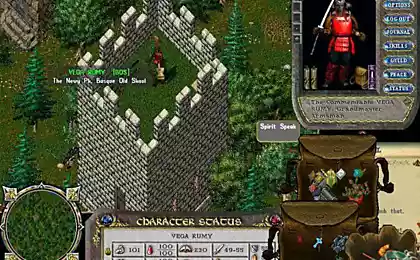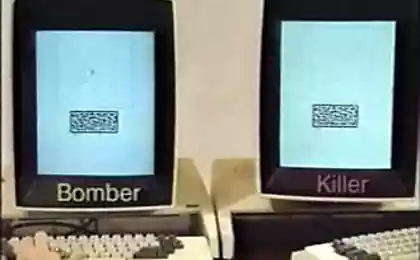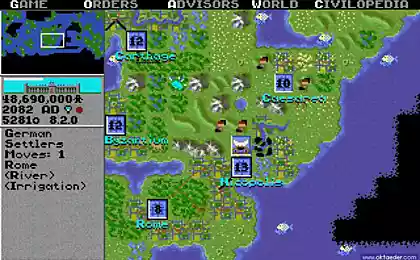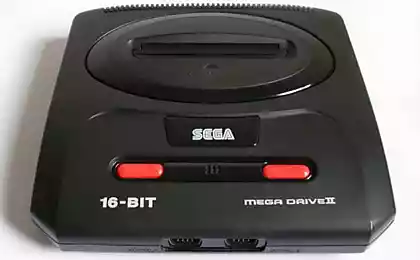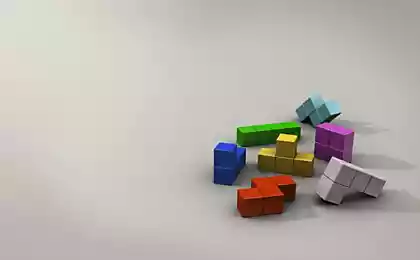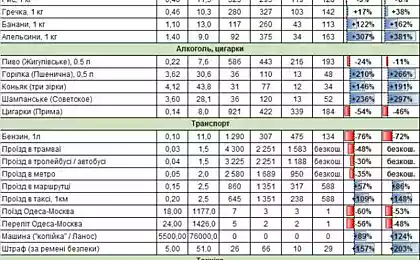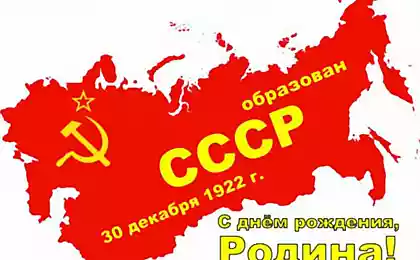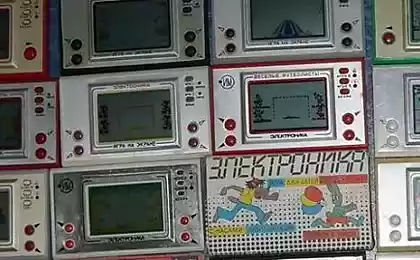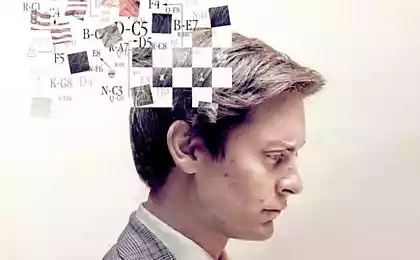1530
Tetrisovskaya history
Surely every one of you was a kid Tetris. Did you know that it was invented by a Soviet programmer Alexey Pajitnov, and he did it in two weeks? Today we tell you about this cult toy and its inventor. Mid-80s. Time, covered with legends. For example, one of them says that in 1984, in the mind of a young employee of the Moscow Computing Center USSR Academy of Sciences Yevgeny Veselov, to spend their holidays in the Crimea, the idea multiwindow text editor E-9. Later he would become the prototype of the well-known "Lexicon", by which, again according to the legend, during the testing of the product will encourage the most distinguished "bug hunters" beer ...
The Computing Center of the USSR in those years a lot of people work, subsequently securely and regardless of their desire to label "legendary figures" Evgeny Veselov Anton Chizhov, Arkady Borkowski. Among them was Alexey Pajitnov - the person to whom fate has prepared to become a kind of mirror of change that began with the coming to power of Mikhail Gorbachev.
Working in the Computing Center of the USSR, Pajitnov dealt with problems of artificial intelligence and speech recognition. According to him, at that time, he often had to write game programs - a good tool for testing new equipment. Most attracted Alexei puzzle game. Especially I liked it a classic puzzle game Pentomino Puzzle, in which the flat figure of twelve types, consisting of variously located five square items need to put in a certain order so as to obtain a predetermined formu1.
To start Pajitnov wrote a program that changes the position of the figures, rotating them 90 degrees relative to the center of gravity. At the time, he later recalled, he thought that in real time it would look great. However, for the game "was" in real time, computing resources are required, which the then microcomputers did not have. Pajitnov and simplified puzzle taking shape, do not consist of five and four square elements that determined the name of the game - "Tetris" from the Greek tetra («four»).
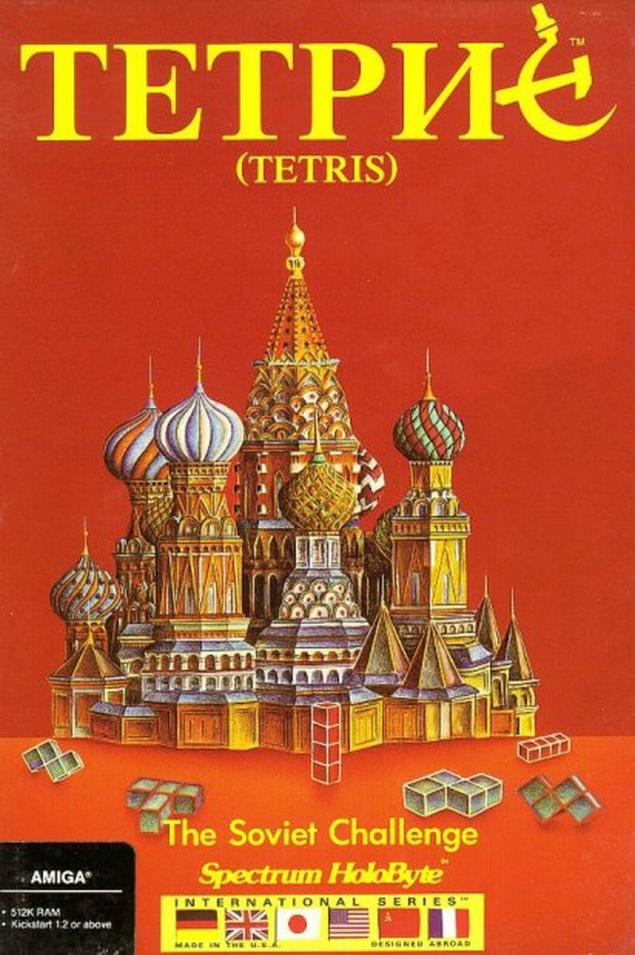
Outside it was 1985. Writing "Tetris" in Pascal for "Electronics-60" at Pajitnov, he says, it took about two weeks. Alexei colleagues at work were thrilled with his program, but he knew that to expand the audience of the game can only be if it will be ported to the IBM PC. This Pajitnov helped his friend Vadim Gerasimov, and after a few weeks the whole computer Moscow already knew what "Tetris».
The subsequent history of "Tetris" is full of adventure. In 1986, the game comes to the international arena - Hungarian programmers porting "Tetris" on the platform Apple II and Commodore 64. These programs fall into the eye of Robert Stein (Robert Stein), President of the British company Andromeda. At first, as evidenced by a number of sources, Stein set out to acquire the rights to the PC-version of "Tetris" or directly from Pajitnov at the USSR Academy of Sciences, all the rest - the "Hungarian comrades." However, it has not yet begun negotiations with the Soviet side, Stein offers Mirrorsoft company and its US subsidiary company Spectrum Holobyte rights to all variations of "Tetris", except for the console and versions for handheld devices. Only a few months later, Stein appears in Moscow and trying to enter into negotiations about the acquisition of the rights to "Tetris" - to no avail. As later write Western sources, Russian compensate for the lack of knowledge in the field of copyright, its incredible stubbornness.
Meanwhile Spectrum Holobyte and Mirrorsoft released its own version of "Tetris", adding to the game quality by the standards of that time graphics and sound, as well as "Russian flavor" - in the Wallpaper program appear Yuri Gagarin, Mathias Rust, shortly before it embarked his sports plane on Red Square, and other characters befitting the occasion. In the eyes of the born sensation - the first game of the "Iron Curtain»!
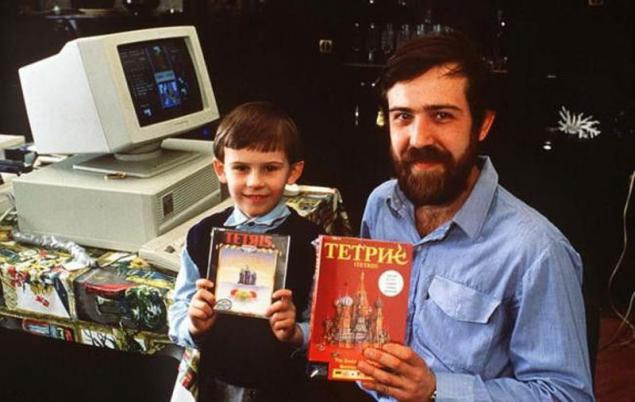
By the autumn of 1987 a persistent Stein gets right to the version of "Tetris" for IBM PC-compatible and "all other computer systems", but ... he still has no agreements with the Soviet organizations. Stein's plan to take control of "Tetris", bypassing everything connected with the Soviet Union, almost succeeded. But the case suddenly intervenes broadcaster CBS - in her air there is an interview with Alexey Pajitnov, who presented to the audience as a game developer.
To negotiate with Stein connects foreign trade association "Elektronorgtehnika", created at the Ministry of Foreign Trade (This organization still exists today, of course, in the form of a joint stock company, and quite modest). It is difficult to assess how powerful was this structure in the 80-ies., But it is known that members of its overseas offices deported back home on suspicion of espionage. However, the same thing happened periodically with employees and other Soviet foreign trade agencies.
Leaders' Elektronorgtehniki "quickly realize that Stein, without actually having any rights to" Tetris ", does dispose of them. The most "Elektronorgtehnike 'rights also do not formally belong. It operates on behalf of the state - the Soviet Union is only beginning to emerge new economic relations.
By May 1988, when the "Tetris" has firmly held on the bestseller list of computer games in the US and the UK, Stein finally manage to get on the Soviet side of the right to the computer version of the game, but not its variations for consoles and handhelds. Luck smiles at him, and Stein both hands in a hurry to grab it by the tail. The Englishman is trying to persuade the leadership "Elektronorgtehniki" pass it right on the console versions of "Tetris." Stein wants too much at once, but in matters of finance charges, he was not in a hurry, it can not but cause frustration among the partners on the Soviet side.
While Stein wasting time on persuasion leaders "Elektronorgtehniki», Spectrum Holobyte Mirrorsoft and on terms to sell the rights to sub-license for the development of the console versions of "Tetris", respectively firms Bullet-Proof Software and Atari Games. In this first gets the opportunity to develop programs for systems sold in the Japanese market. Terms of the second is much more profitable - its "zone of responsibility" includes Japan and the United States.
Both companies - Spectrum Holobyte and Mirrorsoft - in fact, owned by media tycoon Robert Maxwell. Conflict between them is inevitable, but the flames will flare up it immediately. Meanwhile, Maxwell takes the side Mirrorsoft - British shirt closer to the body. In the future, this is reflected in the course of events. Bullet-Proof Software gets back the rights to release the console "Tetris" for the Japanese market. In November 1988 the company is "Tetris" for game consoles Famicom, an analogue of which is known in the United States under the trademark Nintendo Entertainment System. There will be sold 2 million cartridges "Tetris" for the Famicom.
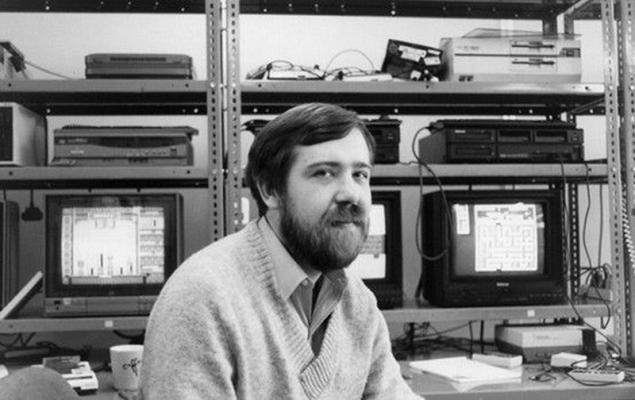
Getting 1989. Nintendo is under way to develop a handheld gaming PC Game Boy. The head of the American branch of the company Minoru Arakawa (Minoru Arakawa) urges the president Bullet-Proof Software Henk Rogers (Henk Rogers) to enter into negotiations with Stein about the possibility of developing a version of "Tetris" for the Game Boy. He agreed, however, Stein does not respond to attempts to enter into contact with him. Then Rogers flying to Moscow. Feeling suspicious, followed him to the capital of the Soviet Union and sent to Stein. There also flies and Kevin Maxwell - son of media mogul. The denouement is approaching - all three of them come to the Ancient almost simultaneously.
The first in the "Elektronorgtehnike" met Rogers. President of Bullet-Proof Software already knows and Vladimir Pohilko Pajitnov, who before joining the development of computer games was a professor of psychology at Moscow State University. Rogers makes a favorable impression on buddies and contracts according to which his company can now develop a version of "Tetris" for handheld devices. Then he proudly displays his newfound partner ... version of "Tetris" for the Famicom. Dumb. Officials from "Elektronorgtehniki" shocked - Rogers had no right to create a console version of the game!
Here it is necessary to digress. All that is said in this article took place in the Soviet times, when the awareness of the citizens about what is happening in the country and abroad is poor. For various reasons, the participants of the events of those years, most of them are not very willing to share memories and information, because you have to collect literally piece by piece from a variety of sources. Check them is not always easy, so we can not vouch for the absolute reliability of the material contained in this fact. However, they have been subjected to scrutiny during which versions of various sources were compared with each other, and the facts, the credibility of which raises suspicions were discarded. We have no reason to say that in fact everything is different, but we are grateful for clarification, amendments and additions to the information available to us.
So, we left President Bullet-Proof Software Moscow in February 1989 in a very interesting position. Realizing that the deal on the verge of collapse, Rogers tries to explain the nature of its relationship with Spectrum Holobyte, Mirrorsoft and Tengen - a division of Atari Games, involved in the development of console games. He had a right to acquire a Japanese "Tetris" and even Tengen. And that, in turn, having a license for the development of programs for the Nintendo Entertainment System, made a special chip that allows you to bypass the security mechanisms of Nintendo and create cartridges for this gaming system from non-licensees Nintendo. Contradictions between Nintendo and Atari (with Atari Games and Tengen) are so deep that almost no one doubts the length of the confrontation of these firms. Looking ahead, it should be noted that this eventually happened - proceedings between Nintendo and Atari continued until 1993
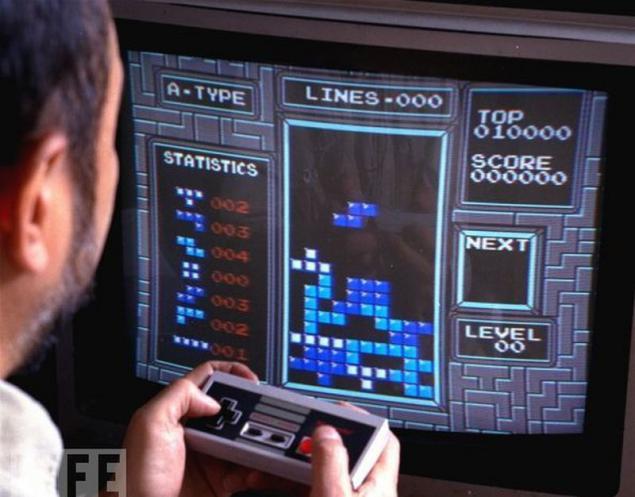
Realizing that the decisive moment has come, and a chance to get everything right on the console versions of "Tetris," Rogers casts doubts on the Atari (in fact on its side Nintendo, which is also good). He pulls out a checkbook ... to pay royalties for the already sold cartridges "Tetris" for the Famicom. On the same day in the "Elektronorgtehnike" take Stein. He signed addition to his existing contract, which is characterized as a computer system, with components such as the processor, monitor, hard drive (one or more), keyboard and operating system. Later, he realized that it was an integral part of the plan conceived by Rogers. Meanwhile, Stein promise that, although he can not yet get the rights to the version of "Tetris" for handheld computers, the contract on the console versions of it, if he so wishes, be able to conclude.
Stein, of course, willing, but the contract will be awarded to him three days later - after being in the "Elektronorgtehnike" visited Kevin Maxwell and his show cartridge "Tetris" for the Famicom. Being completely ignorant about the actions of the company, founded by his father, Kevin initially refuses to believe his interlocutors. However, the cartridge clearly visible inscription - Mirrorsoft. Younger Maxwell has no choice but to say that this is, in all probability, a pirated copy. But here they do not believe Kevin Russian.
In March 1989, Rogers again in Moscow, where behind him arrive Arakawa and CEO of the American branch of Nintendo, Howard Lincoln (Howard Lincoln). In "Elektronorgtehnike" assured them that if the theme of "Tetris" will pop up in the court proceedings between Atari and Nintendo (and it will pop up!), Then Nintendo can count on "Moscow's help." The meeting ends with the signing of the contract, the amount of which is estimated by various sources from 3 to 5 million dollars.
Nintendo officially notify Atari Games, that that is not the legal right to release "Tetris" for the Nintendo Entertainment System. Only two weeks later, Tengen will apply for a copyright on the product.
Robert Maxwell in a rage - and Atari Mirrorsoft position urgently need to be strengthened. Trying to turn the tide, he uses the resources of his empire, which includes the newspaper group Mirror Newspaper Group (in England) and the publishing house Macmillan (US). Links Maxwell extensive - no wonder it is called at the time "is probably not only a Soviet agent." The Government of the United Kingdom and the Soviet Union enter into a dialogue with the tycoon. Maxwell From Moscow comes the assurance that he "did not need to worry about the Japanese company." Some sources and still believe that the message was sent personally by Mikhail Gorbachev.
We are approaching the moment of truth. In April, Lincoln once again arrives in Moscow and is convinced that "Elektronorgtehnika" does not want to cede power structures. In May comes out "Tetris" for the Nintendo Entertainment System from the Tengen. In June, begin hearing against Nintendo and Tengen Atari Games. June 15 Judge Fern Smith (Fern Smith) decides in favor of Nintendo - Tengen banned the production and sale of "Tetris." It takes a little more time, and Nintendo is a Game Boy, supplied which, of course, include "Tetris».
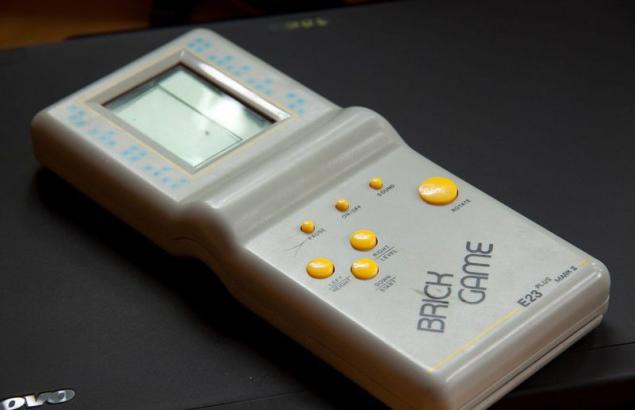
The finale of our stories, alas, it is quite typical of "perestroika" of events. Expenses in the exact estimates, most analysts agree that 1989 has sold over 30 million copies of the Game Boy. Alexey Pajitnov this, however, did not bring any income. I did not get it, "naturally", and contributions from numerous clones "Tetris", not all of which the creators were as disinterested. However, to say that the author of "Tetris" underwent hardships, would be an exaggeration - by Soviet standards life Alexei looked quite happy.
In 1988, with the help of Rogers and his Pohilko managed to organize in Moscow the firm AnimaTek. Like "Elektronorgtehnika", the company also did not stop their activities, only its headquarters relocated to San Francisco. Now AnimaTek still borrow generation of three-dimensional virtual worlds. Technologies of this company have been successfully used in such well-known projects such as Age of Empires (Microsoft), War Zone 2100 (Pumpkin Studios / Eidos), Final Fantasy Tactics (Square).
In 1991, Pajitnov left for America. Rogers was his friend and helped organize the company Tetris. Through her, Alex finally started receiving revenues from the "Tetris" with the help of another company ... Rogers - Blue Planet Software.
Also in 1991 under mysterious circumstances, ended the life of media tycoon Robert Maxwell, whose role in all the twists and turns around the "Tetris" now, after more than a decade, it seems rather strange.
To go to America and Vladimir Pohilko. He remained president until his AnimaTek tragic death in September 1998, when 44-year-old Pohilko, his wife and son were found dead with signs of violent death in their home in Palo Alto.
In October 1996, Pajitnov has joined the team of developers Microsoft, creates new computer puzzle. In September 1999, Microsoft released a series of puzzles Pandora's Box, stressing that the head of this project was "renowned designer" Tetris "Alexey Pajitnov» ...
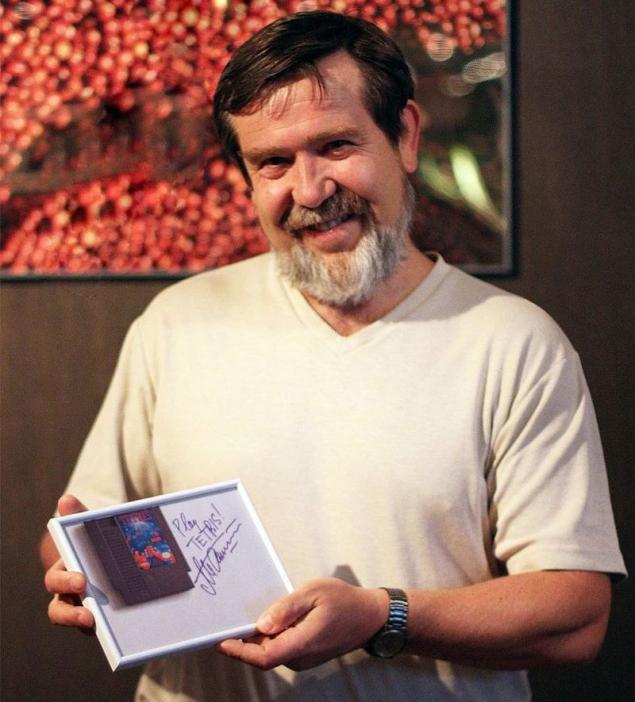
Source: masterok.livejournal.com
The Computing Center of the USSR in those years a lot of people work, subsequently securely and regardless of their desire to label "legendary figures" Evgeny Veselov Anton Chizhov, Arkady Borkowski. Among them was Alexey Pajitnov - the person to whom fate has prepared to become a kind of mirror of change that began with the coming to power of Mikhail Gorbachev.
Working in the Computing Center of the USSR, Pajitnov dealt with problems of artificial intelligence and speech recognition. According to him, at that time, he often had to write game programs - a good tool for testing new equipment. Most attracted Alexei puzzle game. Especially I liked it a classic puzzle game Pentomino Puzzle, in which the flat figure of twelve types, consisting of variously located five square items need to put in a certain order so as to obtain a predetermined formu1.
To start Pajitnov wrote a program that changes the position of the figures, rotating them 90 degrees relative to the center of gravity. At the time, he later recalled, he thought that in real time it would look great. However, for the game "was" in real time, computing resources are required, which the then microcomputers did not have. Pajitnov and simplified puzzle taking shape, do not consist of five and four square elements that determined the name of the game - "Tetris" from the Greek tetra («four»).

Outside it was 1985. Writing "Tetris" in Pascal for "Electronics-60" at Pajitnov, he says, it took about two weeks. Alexei colleagues at work were thrilled with his program, but he knew that to expand the audience of the game can only be if it will be ported to the IBM PC. This Pajitnov helped his friend Vadim Gerasimov, and after a few weeks the whole computer Moscow already knew what "Tetris».
The subsequent history of "Tetris" is full of adventure. In 1986, the game comes to the international arena - Hungarian programmers porting "Tetris" on the platform Apple II and Commodore 64. These programs fall into the eye of Robert Stein (Robert Stein), President of the British company Andromeda. At first, as evidenced by a number of sources, Stein set out to acquire the rights to the PC-version of "Tetris" or directly from Pajitnov at the USSR Academy of Sciences, all the rest - the "Hungarian comrades." However, it has not yet begun negotiations with the Soviet side, Stein offers Mirrorsoft company and its US subsidiary company Spectrum Holobyte rights to all variations of "Tetris", except for the console and versions for handheld devices. Only a few months later, Stein appears in Moscow and trying to enter into negotiations about the acquisition of the rights to "Tetris" - to no avail. As later write Western sources, Russian compensate for the lack of knowledge in the field of copyright, its incredible stubbornness.
Meanwhile Spectrum Holobyte and Mirrorsoft released its own version of "Tetris", adding to the game quality by the standards of that time graphics and sound, as well as "Russian flavor" - in the Wallpaper program appear Yuri Gagarin, Mathias Rust, shortly before it embarked his sports plane on Red Square, and other characters befitting the occasion. In the eyes of the born sensation - the first game of the "Iron Curtain»!

By the autumn of 1987 a persistent Stein gets right to the version of "Tetris" for IBM PC-compatible and "all other computer systems", but ... he still has no agreements with the Soviet organizations. Stein's plan to take control of "Tetris", bypassing everything connected with the Soviet Union, almost succeeded. But the case suddenly intervenes broadcaster CBS - in her air there is an interview with Alexey Pajitnov, who presented to the audience as a game developer.
To negotiate with Stein connects foreign trade association "Elektronorgtehnika", created at the Ministry of Foreign Trade (This organization still exists today, of course, in the form of a joint stock company, and quite modest). It is difficult to assess how powerful was this structure in the 80-ies., But it is known that members of its overseas offices deported back home on suspicion of espionage. However, the same thing happened periodically with employees and other Soviet foreign trade agencies.
Leaders' Elektronorgtehniki "quickly realize that Stein, without actually having any rights to" Tetris ", does dispose of them. The most "Elektronorgtehnike 'rights also do not formally belong. It operates on behalf of the state - the Soviet Union is only beginning to emerge new economic relations.
By May 1988, when the "Tetris" has firmly held on the bestseller list of computer games in the US and the UK, Stein finally manage to get on the Soviet side of the right to the computer version of the game, but not its variations for consoles and handhelds. Luck smiles at him, and Stein both hands in a hurry to grab it by the tail. The Englishman is trying to persuade the leadership "Elektronorgtehniki" pass it right on the console versions of "Tetris." Stein wants too much at once, but in matters of finance charges, he was not in a hurry, it can not but cause frustration among the partners on the Soviet side.
While Stein wasting time on persuasion leaders "Elektronorgtehniki», Spectrum Holobyte Mirrorsoft and on terms to sell the rights to sub-license for the development of the console versions of "Tetris", respectively firms Bullet-Proof Software and Atari Games. In this first gets the opportunity to develop programs for systems sold in the Japanese market. Terms of the second is much more profitable - its "zone of responsibility" includes Japan and the United States.
Both companies - Spectrum Holobyte and Mirrorsoft - in fact, owned by media tycoon Robert Maxwell. Conflict between them is inevitable, but the flames will flare up it immediately. Meanwhile, Maxwell takes the side Mirrorsoft - British shirt closer to the body. In the future, this is reflected in the course of events. Bullet-Proof Software gets back the rights to release the console "Tetris" for the Japanese market. In November 1988 the company is "Tetris" for game consoles Famicom, an analogue of which is known in the United States under the trademark Nintendo Entertainment System. There will be sold 2 million cartridges "Tetris" for the Famicom.

Getting 1989. Nintendo is under way to develop a handheld gaming PC Game Boy. The head of the American branch of the company Minoru Arakawa (Minoru Arakawa) urges the president Bullet-Proof Software Henk Rogers (Henk Rogers) to enter into negotiations with Stein about the possibility of developing a version of "Tetris" for the Game Boy. He agreed, however, Stein does not respond to attempts to enter into contact with him. Then Rogers flying to Moscow. Feeling suspicious, followed him to the capital of the Soviet Union and sent to Stein. There also flies and Kevin Maxwell - son of media mogul. The denouement is approaching - all three of them come to the Ancient almost simultaneously.
The first in the "Elektronorgtehnike" met Rogers. President of Bullet-Proof Software already knows and Vladimir Pohilko Pajitnov, who before joining the development of computer games was a professor of psychology at Moscow State University. Rogers makes a favorable impression on buddies and contracts according to which his company can now develop a version of "Tetris" for handheld devices. Then he proudly displays his newfound partner ... version of "Tetris" for the Famicom. Dumb. Officials from "Elektronorgtehniki" shocked - Rogers had no right to create a console version of the game!
Here it is necessary to digress. All that is said in this article took place in the Soviet times, when the awareness of the citizens about what is happening in the country and abroad is poor. For various reasons, the participants of the events of those years, most of them are not very willing to share memories and information, because you have to collect literally piece by piece from a variety of sources. Check them is not always easy, so we can not vouch for the absolute reliability of the material contained in this fact. However, they have been subjected to scrutiny during which versions of various sources were compared with each other, and the facts, the credibility of which raises suspicions were discarded. We have no reason to say that in fact everything is different, but we are grateful for clarification, amendments and additions to the information available to us.
So, we left President Bullet-Proof Software Moscow in February 1989 in a very interesting position. Realizing that the deal on the verge of collapse, Rogers tries to explain the nature of its relationship with Spectrum Holobyte, Mirrorsoft and Tengen - a division of Atari Games, involved in the development of console games. He had a right to acquire a Japanese "Tetris" and even Tengen. And that, in turn, having a license for the development of programs for the Nintendo Entertainment System, made a special chip that allows you to bypass the security mechanisms of Nintendo and create cartridges for this gaming system from non-licensees Nintendo. Contradictions between Nintendo and Atari (with Atari Games and Tengen) are so deep that almost no one doubts the length of the confrontation of these firms. Looking ahead, it should be noted that this eventually happened - proceedings between Nintendo and Atari continued until 1993

Realizing that the decisive moment has come, and a chance to get everything right on the console versions of "Tetris," Rogers casts doubts on the Atari (in fact on its side Nintendo, which is also good). He pulls out a checkbook ... to pay royalties for the already sold cartridges "Tetris" for the Famicom. On the same day in the "Elektronorgtehnike" take Stein. He signed addition to his existing contract, which is characterized as a computer system, with components such as the processor, monitor, hard drive (one or more), keyboard and operating system. Later, he realized that it was an integral part of the plan conceived by Rogers. Meanwhile, Stein promise that, although he can not yet get the rights to the version of "Tetris" for handheld computers, the contract on the console versions of it, if he so wishes, be able to conclude.
Stein, of course, willing, but the contract will be awarded to him three days later - after being in the "Elektronorgtehnike" visited Kevin Maxwell and his show cartridge "Tetris" for the Famicom. Being completely ignorant about the actions of the company, founded by his father, Kevin initially refuses to believe his interlocutors. However, the cartridge clearly visible inscription - Mirrorsoft. Younger Maxwell has no choice but to say that this is, in all probability, a pirated copy. But here they do not believe Kevin Russian.
In March 1989, Rogers again in Moscow, where behind him arrive Arakawa and CEO of the American branch of Nintendo, Howard Lincoln (Howard Lincoln). In "Elektronorgtehnike" assured them that if the theme of "Tetris" will pop up in the court proceedings between Atari and Nintendo (and it will pop up!), Then Nintendo can count on "Moscow's help." The meeting ends with the signing of the contract, the amount of which is estimated by various sources from 3 to 5 million dollars.
Nintendo officially notify Atari Games, that that is not the legal right to release "Tetris" for the Nintendo Entertainment System. Only two weeks later, Tengen will apply for a copyright on the product.
Robert Maxwell in a rage - and Atari Mirrorsoft position urgently need to be strengthened. Trying to turn the tide, he uses the resources of his empire, which includes the newspaper group Mirror Newspaper Group (in England) and the publishing house Macmillan (US). Links Maxwell extensive - no wonder it is called at the time "is probably not only a Soviet agent." The Government of the United Kingdom and the Soviet Union enter into a dialogue with the tycoon. Maxwell From Moscow comes the assurance that he "did not need to worry about the Japanese company." Some sources and still believe that the message was sent personally by Mikhail Gorbachev.
We are approaching the moment of truth. In April, Lincoln once again arrives in Moscow and is convinced that "Elektronorgtehnika" does not want to cede power structures. In May comes out "Tetris" for the Nintendo Entertainment System from the Tengen. In June, begin hearing against Nintendo and Tengen Atari Games. June 15 Judge Fern Smith (Fern Smith) decides in favor of Nintendo - Tengen banned the production and sale of "Tetris." It takes a little more time, and Nintendo is a Game Boy, supplied which, of course, include "Tetris».

The finale of our stories, alas, it is quite typical of "perestroika" of events. Expenses in the exact estimates, most analysts agree that 1989 has sold over 30 million copies of the Game Boy. Alexey Pajitnov this, however, did not bring any income. I did not get it, "naturally", and contributions from numerous clones "Tetris", not all of which the creators were as disinterested. However, to say that the author of "Tetris" underwent hardships, would be an exaggeration - by Soviet standards life Alexei looked quite happy.
In 1988, with the help of Rogers and his Pohilko managed to organize in Moscow the firm AnimaTek. Like "Elektronorgtehnika", the company also did not stop their activities, only its headquarters relocated to San Francisco. Now AnimaTek still borrow generation of three-dimensional virtual worlds. Technologies of this company have been successfully used in such well-known projects such as Age of Empires (Microsoft), War Zone 2100 (Pumpkin Studios / Eidos), Final Fantasy Tactics (Square).
In 1991, Pajitnov left for America. Rogers was his friend and helped organize the company Tetris. Through her, Alex finally started receiving revenues from the "Tetris" with the help of another company ... Rogers - Blue Planet Software.
Also in 1991 under mysterious circumstances, ended the life of media tycoon Robert Maxwell, whose role in all the twists and turns around the "Tetris" now, after more than a decade, it seems rather strange.
To go to America and Vladimir Pohilko. He remained president until his AnimaTek tragic death in September 1998, when 44-year-old Pohilko, his wife and son were found dead with signs of violent death in their home in Palo Alto.
In October 1996, Pajitnov has joined the team of developers Microsoft, creates new computer puzzle. In September 1999, Microsoft released a series of puzzles Pandora's Box, stressing that the head of this project was "renowned designer" Tetris "Alexey Pajitnov» ...

Source: masterok.livejournal.com
